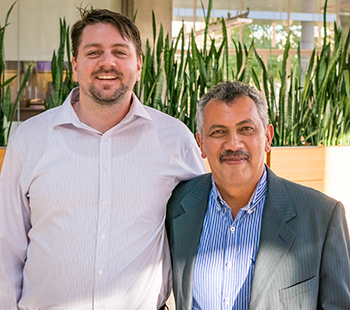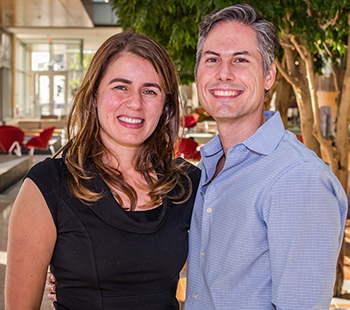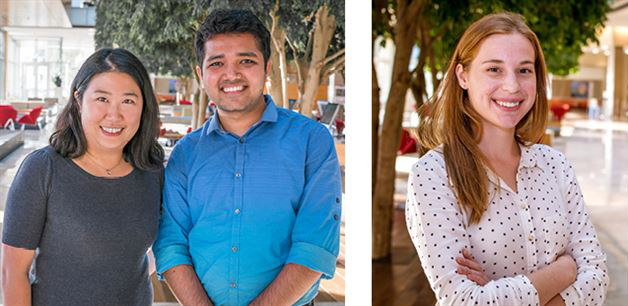CONTACT:
Jeanan Yasiri Moe, Director of Strategic Communications
[email protected] | 608.890.1491
MADISON, Wis. – A potential vaccine for a front-page virus and a real-time method to monitor sedated patients have taken top honors from the Wisconsin Alumni Research Foundation (WARF). The winning teams are led by UW–Madison’s Jorge Osorio and Guelay Bilen-Rosas.
“The Innovation Awards highlight some of the most sensational ideas being developed across disciplines,” said Erik Iverson, managing director of WARF, the nonprofit organization that helps patent and advance campus research.
“These awards are all about the future,” added Chancellor Rebecca Blank. “These projects show enormous promise.”

One of the prizewinning inventions could help turn the tide against Zika virus, which has received unprecedented attention due to its rapid march through the Americas and link to severe neurological birth defects, including microcephaly. An estimated 1.65 million women of childbearing age in Latin America and the Caribbean could be infected before the epidemic abates.
There are currently no approved vaccines or therapies for Zika. But Jorge Osorio and Brock Bakke (pathobiological sciences) aim to change that. They have developed a possible vaccine based on virus-like particles (VLPs), which structurally mimic the virus but do not contain infectious genetic material. This approach is safer for pregnant women and other high-risk populations.
“I know we are in Wisconsin and sometimes we think we are far away,” said Osorio. “But any of us can suffer. This is a UW response to a public health emergency.”

Drs. Guelay Bilen-Rosas (pediatric anesthesiology) and Humberto Rosas (radiology) also took home top honors for their work developing a non-invasive ultrasound monitor that can attach to the neck of a sedated patient and ensure that he or she is breathing properly.
It is a first-ever collaboration for the two researchers, who are married.
The need is real – airway compromise remains one of the most dangerous emergencies encountered by health care providers at all levels. If not detected early it can cause brain damage and death.
The risk is only growing as more procedures requiring sedation are pushed to outpatient settings where often there is no clinically trained anesthesiologist on site to monitor and intervene if necessary.
“These are amazing doctors, nurses and providers but they don’t have the tools they need,” said Bilen-Rosas. “We think this device has the potential to truly decrease morbidity and mortality.”
An independent panel of judges selected the winners from a field of six finalists drawn from among more than 400 invention disclosures submitted to WARF over the past 12 months. The winning inventions each receive an award of $10,000, with the funds going to the UW–Madison inventors named on the breakthroughs.
The other finalists included:
- Jing Li for new memory architecture
- Zhenqiang ‘Jack’ Ma, Yei Hwan Jung, Shaoqin Gong and Juhwan Lee for stretchable electronic interconnects
- Shannon Stahl and Mohammad Rafiee for a method to derive aromatic compounds from lignin
- Xinyu Zhang and Chi Zhang for their indoor localization system that uses fluorescent light fixtures

WARF staff also announced the winners of the fifth annual Discovery Challenge Awards, granted to teams of graduate students and postdoctoral researchers to carry out exceptional collaborative work.
This year’s winners included: Wei-Hua Lee and Vijesh Bhute, and Brynna Wilken-Resman and Dmitry Malin. The two groups will each receive $7,500 to advance their projects.
The winners were selected from the graduate students and postdoctoral researchers who participated in a research symposium and research award competition to develop cutting-edge, interdisciplinary ideas. The WARF Discovery Challenge is a program pioneered by the WARF student ambassadors with the goal of encouraging graduate students and postdoctoral researchers from across the entire campus to learn from each other and expand their research vision.
About WARF
The Wisconsin Alumni Research Foundation (WARF) helps steward the cycle of research, discovery, commercialization and investment for the University of Wisconsin-Madison. Founded in 1925 as an independent, nonprofit foundation, WARF manages more than 1,700 patents and an investment portfolio of $2.6 billion as it funds university research, obtains patents for campus discoveries and licenses inventions to industry. For more information, visit warf.org.
###